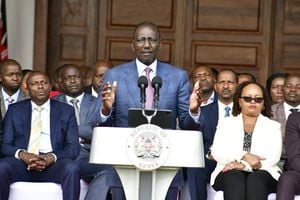
Members of the public are attended to at various desks during the Unclaimed Financial Assents Authority sensitisation at the Central Primary School compound in Eldoret town on November 15, 2023.
It is a good thing that the Finance and Budget Committee of the Senate has shone the spotlight on allegations of financial improprieties at the Unclaimed Financial Assets Authority (Ufaa).
The fund’s CEO, John Mwangi, and board chairman Francis Kigo were on Tuesday grilled by the senators over alleged misappropriation of Sh10 billion in unclaimed assets. Huge discrepancies in the numbers and data disclosed by holding companies, insurance companies, pension funds and NSE-listed entities and records kept by Ufaa were also alleged.
Parliament must go to the bottom of these allegations because at stake here are the interests of poor widows and orphans who desire and deserve to be reunited with their assets sitting idle in Ufaa books.
Yet the veracity or not of the graft allegations being interrogated by Parliament aside, big policy and legal questions arise. I suggest to the legislators to repeal some sections of the law introduced by then-Cabinet Secretary Ukur Yatani through the Finance Bill, 2022.
I refer to the amendments that waived penalties to insurance companies, pension funds, commercial banks, bourse-listed firms and other entities that delay or refuse to remit unclaimed assets to Ufaa. Mr Yatani’s amendment amounted to repealing the entire law because the whole purpose of the interest and penalties was to impose punitive fines for non-compliance.
Interest and penalties
By waiving interest and penalties on unremitted unclaimed financial assets, Yatani effectively eliminated the only lever that supports enforcement and compliance of the law, which cannot be voluntary.
Secondly, as Ufaa approaches 10 years of existence, there’s a strong case for reviewing the law on how and where the billions that sit in its account are invested and managed. There is a need for a review of its investment mandate and guidelines.
First, there seems to be a good case for separation of regulation from asset management. You remove conflict of interest, as happened when the Deposit Protection Fund Board was removed from the grip of the Central Bank of Kenya. Secondly, there is a very strong case for bringing Ufaa into the ambit of full compliance with the Retirement Benefits Authority regulations.
Ufaa will then be forced to appoint independent fund managers and custodians. We will no longer hear about how Ufaa has spent Sh500 million on engaging auditors. Even the largest companies in this country do not spend that kind of money on audit services.
Strong case
Thirdly, there is a strong case, indeed, for decentralising the operations of Ufaa. Most of the orphans and widows who should be reunited with their money live in the rural areas. Bringing the fund under RBA regulations will help to insulate it further from corrupt elites’ games and shenanigans.
The fund sits on a whopping Sh63 billion. If you don’t insulate that from the ‘eating chiefs’, the political elite will come up with tricks of spending the money on political projects.
The potential for growth in the fund is huge. A baseline survey commissioned by the authority revealed that, as of October 2018, the number of accounts holding unclaimed financial assets in various institutions in the country was 477,000.
The crafters of the original framework rightly provided that the money could only be invested in Treasury Bills.
It was the right decision. Had that not happened, the political elite would have turned it into another source of largesse, where they can draw funds willy-nilly to finance ill-conceived grand projects that only serve to create opportunities for kick-backs and back-handers for the corrupt.
Politically connected
Had they left everything to the discretion of the politically appointed boards, we would, by now, be seeing a new multi-storey corporate headquarters built by the fund. We would also be hearing how the fund was negotiating to buy a quarry somewhere from some politically connected individual or other.
During the Covid-19 pandemic, the National Treasury, under Yatani, invited suggestions on how to loosen the rules restricting investment to Treasury Bills and bring other asset classes into the picture.
This column opposed the idea, arguing that the proposed changes to the law and framework were bound to introduce loopholes which rent-seeking elites would be just too ready and eager to exploit.
Going forward, let’s discuss whether to follow and adopt the international best practice where the regulator’s role is restricted licensing service providers.
It seems that, sooner or later, and as the number of claimants continue to increase, the queues will just be too long for Ufaa to handle. We will need to evolve a network of service providers giving a range of advisory services to members of the public.
Lastly, we should consider expanding Ufaa’s scope to beyond recovering unclaimed financial assets, such as handling property as well.










